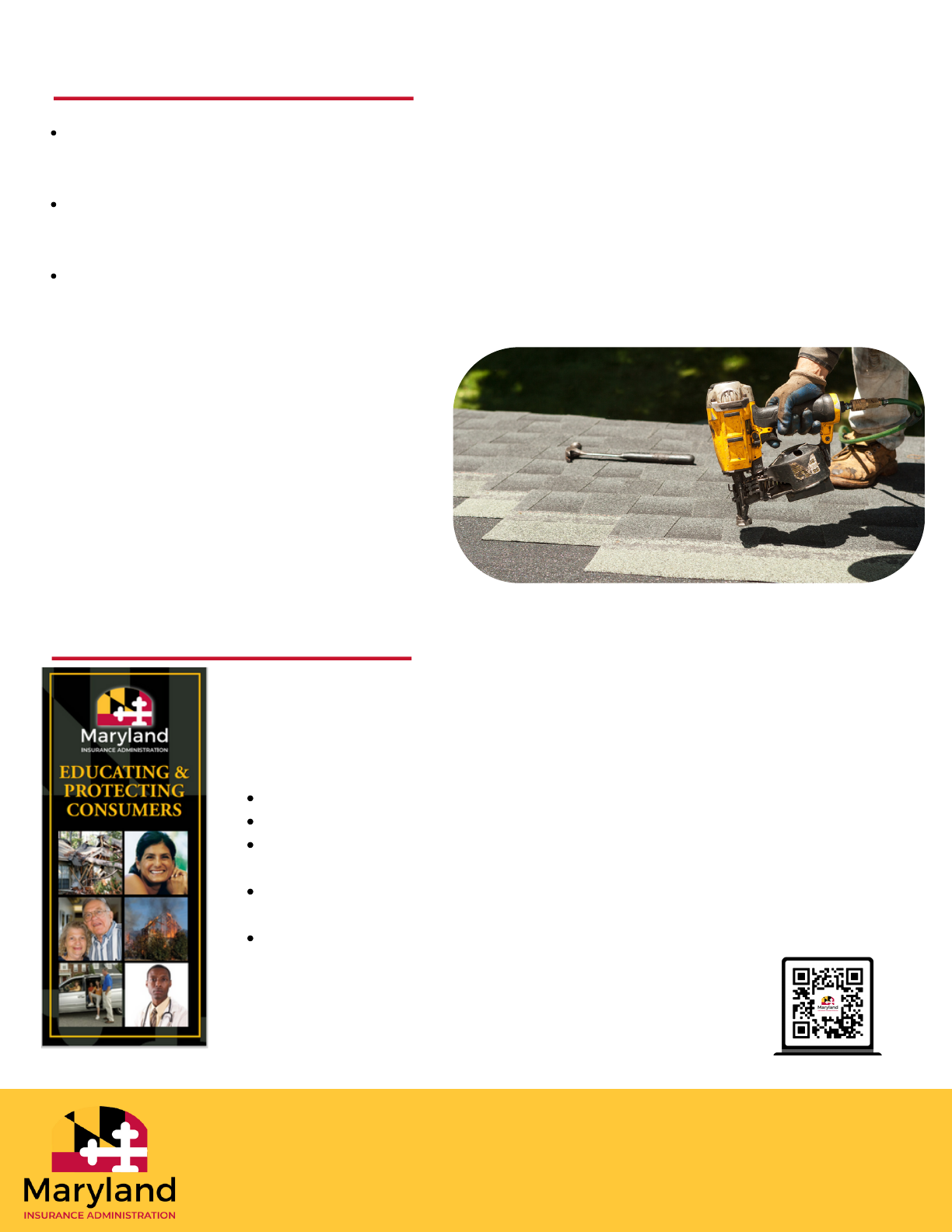
BALTIMORE – The Maryland Insurance Administration (MIA) is reminding consumers to proceed with
caution when approached by roofing contractors with unsolicited offers to inspect their roof for damage
in order to generate an insurance claim. Too often, these offers are part of a fraud scheme by dishonest
contractors who misrepresent wear-and-tear as storm damage or, in some extreme cases, actually
damage the roof to create a claim.
“If it sounds too good to be true, it probably is,” said Maryland Insurance Commissioner Kathleen A.
Birrane. “We urge people to use common sense and to do their research before allowing a stranger to
access their property or pursue an insurance claim on their behalf.”
Recently, a Maryland homeowner found a business card with this message written on the back: “New
full roof covered by your insurance due to discontinued shingles. Call for free inspection.” The message
was reported to the MIA and the roofing company that left the message is now under investigation by
the MIA’s Insurance Fraud and Producer Enforcement Division. This kind of message is misleading and a
violation of Maryland insurance law, noted Acting Associate Commissioner for Fraud and Enforcement,
Joe Smith.
Coverage for damage to a roof depends on the cause of the damage and the specific terms of the
insurance policy. Insurers are generally not required to pay for the replacement of an entire roof unless
the entire roof is damaged by a covered cause of loss -- even if the shingles on the roof are no longer
available. Further, homeowners insurance does not pay for roof maintenance or for a roof that has to be
replaced because of normal wear-and-tear.
The MIA’s Consumer Education and Advocacy Unit offers the following tips to homeowners:
Be wary of unsolicited offers to repair your home, particularly if they suggest that your insurer will
pay for the repairs.
Check out a contractor’s license, credentials, and reputation before you allow them to access your
property. Consumers can use the Maryland Home Improvement Commission’s (MHIC) online
database to find out if a contractor is licensed in the state, or call the MHIC at 1-888-218-5925. It is also
a good idea to ask for references and to check with the Better Business Bureau.
CONSUMER ADVISORY
WATCH OUT FOR ‘FREE ROOF’ OFFERS
800-492-6116 Toll-free
insurance.maryland.gov

Contact the Maryland Insurance Administration at:
200 St. Paul Place, Suite 2700
Baltimore, Maryland 21202
410-468-2000 | 800-492-6116 | 800-735-2258 TTY
https://insurance.maryland.gov/Consumer/Pages/FileAComplaint.aspx
ABOUT THE MARYLAND INSURANCE ADMINISTRATION
The Maryland Insurance Administration (MIA) is the state agency that
regulates the business of insurance in Maryland. If you feel that your insurer
or insurance producer acted improperly, you have the right to file a
complaint. The MIA can investigate complaints that an insurer or insurance
producer has:
Denied or delayed payment of all portions of a claim
Improperly terminated your insurance policy
Raised your insurance premiums without proper notice or in
excess of what the law allows
Made false statements to you in connection with the sale of
insurance or the processing of insurance claims
Overcharged you for services, including premium finance charges
This consumer guide should be used for educational purposes only. It is not intended to provide legal advice or opinions regarding coverage under a specific
insurance policy or contract; nor should it be construed as an endorsement of any product, service, person, or organization mentioned in this guide. Please
note that policy terms vary based on the particular insurer and you should contact your insurer or insurance producer (agent or broker) for more information.
This publication has been produced by the Maryland Insurance Administration (MIA) to provide consumers with general information about insurance-related
issues and/or state programs and services. This publication may contain copyrighted material which was used with permission of the copyright owner.
Publication herein does not authorize any use or appropriation of such copyrighted material without consent of the owner. All publications issued by the MIA
are available free of charge on the MIA's website or by request. The publication may be reproduced in its entirety without further permission of the MIA
provided the text and format are not altered or amended in any way, and no fee is assessed for the publication or duplication thereof. The MIA's name and
contact information must remain clearly visible, and no other name, including that of the insurer or insurance producer reproducing the publication, may
appear anywhere in the reproduction. Partial reproductions are not permitted without the prior written consent of the MIA. Persons with disabilities may
request this document in an alternative format. Requests should be submitted in writing to the Director of Communications at the address listed above.
If a contractor is only interested in identifying and repairing damage that might be covered by
insurance, that could be a sign of fraud. An honest contractor lets you know when repairs are
needed and how much they cost; making insurance claims are not their primary concern.
Do not sign a document that purports to “assign” your insurance claim to the contractor. It is illegal
for a contractor to submit and negotiate an insurance claim on your behalf; only a licensed public
adjuster can do that.
When you hire an honest contractor, your insurer will work with you and the contractor to
determine the scope of the covered damage, the amount payable under your policy, and how the
repair costs will be paid.
CONTINUED
Consumers are encouraged to report
suspected insurance fraud activities to the
MIA’s Insurance Fraud Division. You do not
need to give your name. Simply call the
insurance fraud tip line at 1-800-846-4069, or
print and submit the insurance fraud referral
form by mail to the address below.
Consumers may also email fraud referrals by
sending completed forms to
